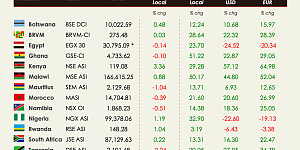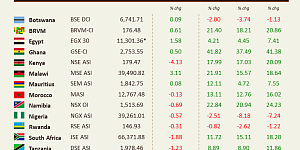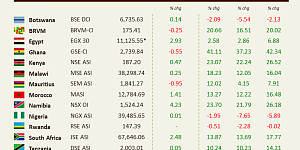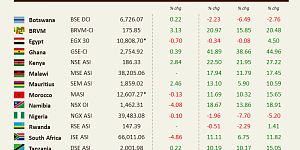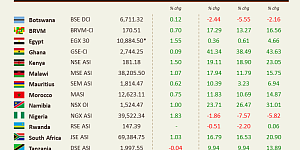Fitch rating agency kept its rating for South African foreign currency and local currency unchanged at the lowest investment grade level on Friday. However, the agency changed its assessment over the outlook to negative from stable based on the continued political instability that the country is facing. Over the last months, political turmoil in the country has weighed on investors' sentiment and increased concerns over the country's ability to make required reforms to turn the economy around. S&P Global Rating is expected to announce its outlook on 2nd December and consequences could be harsh for the country such as increased borrowing costs and making it tougher for the government to meet its debt obligations, obtain credit and meet fiscal targets. Fitch forecasts a GDP growth of 0.5% this year, 1.3% next year and 2.1% in 2018. The JSE ASI closed almost flat at 0.14%.
The NGSE ASI lost 0.80%. It’s no secret that Nigerian economy has been struggling with low growth after oil prices crushed in mid-2014 and, with that, took away a significant source of revenue for the country. Since then the country has faced a shortage of dollar that has suffocated the economy. A black-market has developed in the country and rumor has it that since the central bank has tried to tackle the issue by capping prices non-bank dealers can charge their customers to try to peg the black-market rate, a parallel market has developed within the black market. There is a wide gap between the official naira value of 315 per dollar as set by Nigeria’s interbank market and its value on the black-market of around 456 per dollar. Authorities recently started to menace non-bank dealers with arrest to bring down the gap. In parallel, Nigeria’s central bank kept its benchmark rate unchanged at 14% this week stating that the current challenges are not linked to the monetary policy but structural.
The NSE ASI lost 0.96%. The country cut its forecast for GDP growth to over 6% from 6.5% on weaker credit growth. In August, Kenyatta signed a law to cap charges on bank loans at 4% above the central bank rate of 10%. Banks in the country reacted negatively and the IMF stated the measure could prevent access to loans. It seems it did as credit to private sector grew the slowest pace right after the implementation of this measure, only 7.1% from 17.8% in December. Instead of lending to the private sector, it seems banks have preferred considered risk-free government debt. Now the key question is to which extend slowing credit growth will affect economic growth.
Ghana’s central bank cut its main rate by 50 basis points to 25.5% for the first time since 2011. The market expected a higher cut but it seems inflation is slowing down at a slower pace than expected and the central bank preferred to remain cautious. More cuts are expected from next year. The Governor cited the need to stimulate growth and a better outlook for inflation as reasons for this first cut. This is potentially a signal the government’s plan with the IMF’s help to achieve fiscal stability is reaping fruits. Ghana’s economy has slowed significantly in the recent years following lower commodity prices globally. On 7th December, presidential elections will be held in the country. The GSE-CI lost 3.78%.





